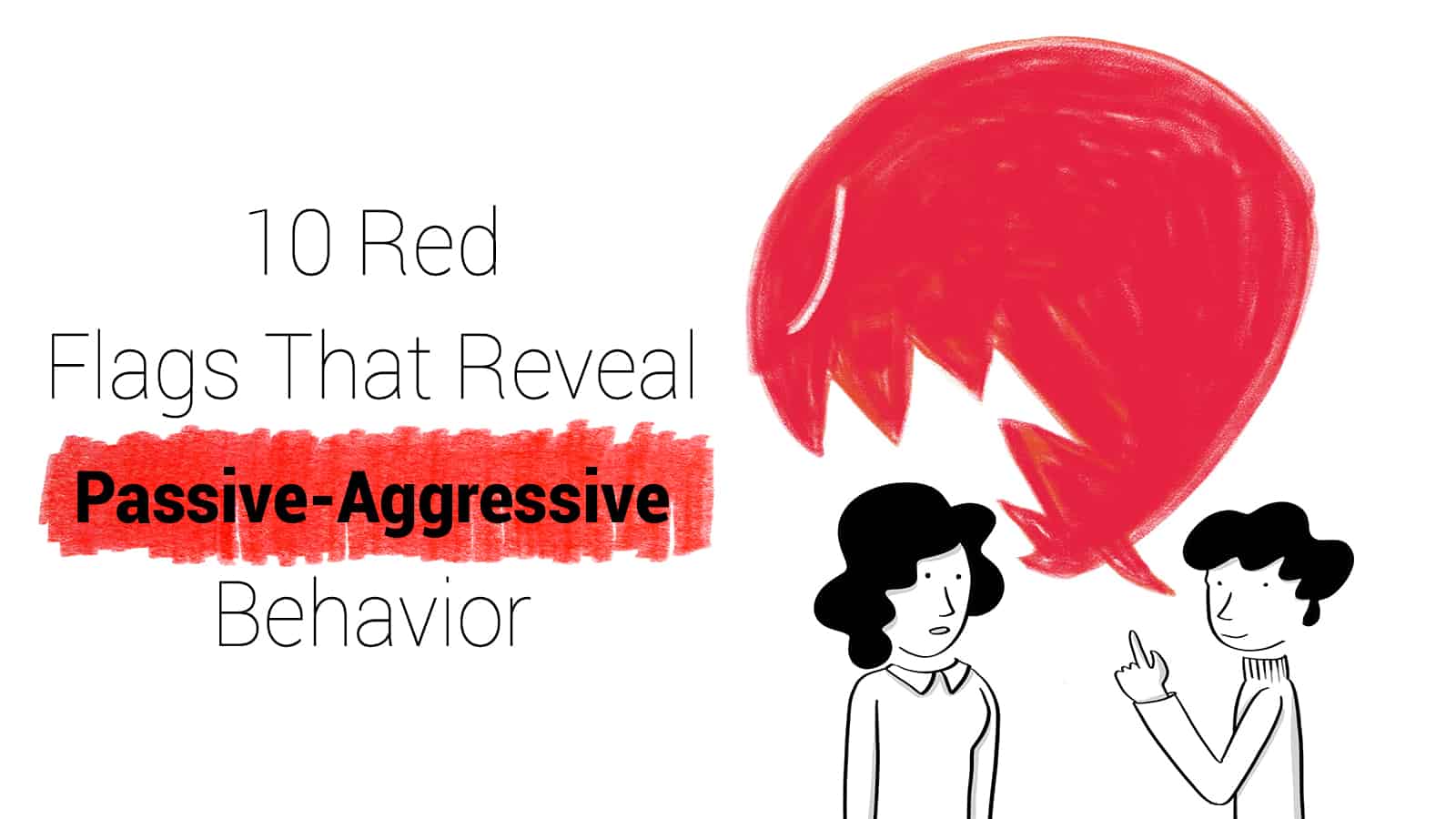Passive-aggressive behavior is something that you or anyone else will undoubtedly use at some point in your life. However, when you make these manners part of your regular conduct, it’s a cause for alarm. Being in a relationship with this type of narcissist is no picnic, and you will undoubtedly play into their many games that keep you questioning your sanity.
You may be confused on the exact definition of a passive-aggressive person, as it’s not a mental health diagnosis but more of a grouping of behaviors. According to Psychology Today, this person has a pattern of indirectly showing harmful reactions to situations rather than addressing things openly.
According to the National Library of Medicine, someone who displays passive-aggressive tendencies has a type of personality disorder that little is known about. Previously, this condition was included in the American Psychological Diagnostic Manual. However, the most current edition, the DSM-5, removed it.
The article further states that familial aggregation is almost always an underlying factor. While it’s a common problem, few studies and research are devoted to this area of mental illness for further understanding.
Red Flags of Passive-Aggressive Behavior
Do you know how to spot passive-aggressive behaviors, or perhaps, you’re guilty of using these tactics yourself? Rather than getting angry at a situation, you will use techniques to confuse or hurt the other person.
This person is the king/queen of denial, as they will become defensive should you accuse them of anything. Here are some of the common signs of this personality disorder.

1. Passive-aggressive Behavior Shows That Someone Is Stubborn
The passive-aggressive narcissist is stubborn, moody, and may even express hostile behavior. It’s scarce that you will find one of these folks that aren’t sullen and argumentative. Sure, everyone acts this way on occasion, but they make it an everyday part of life.
The problem occurs when someone displays these behaviors continually whenever a situation they don’t like occurs. It’s undoubtedly a red flag. Keep in mind that no two people are going to agree with everything.
However, disagreement is not the issue. Instead, they won’t disagree straight to your face, as they would rather pout and play mind games to get their way. Their mouth says one thing but their actions another.
2. They Hold Grudges
Everyone feels resentful at various times in their lives. If you didn’t receive an invitation to a friend’s barbeque, then you might feel anger towards them for excluding you. These feelings are entirely normal, but most people get over them.
However, when someone is passive-aggressive, they will hold grudges indefinitely. They may refuse to ever go to this person’s home again because they didn’t invite them this one time. They don’t know the situation or the circumstances around this event, but they’ve cut them off from their life because they were offended.
3. They Use Silent Treatment as Punishment
Consider this scenario. Curtis is upset because his wife didn’t pay a bill and went shopping instead. He didn’t speak to her rather than talking about his feelings and getting things into the open. He refused to talk to her for over a week.
Day by day, they lived in the same home without a word between them. Finally, Curtis got over his anger and told her why he was so upset. Her financial irresponsibility had brought them in severe trouble too many times. A person with passive-aggressive tendencies wants to punish others for their actions or situations.
To get his point across, Curtis didn’t know how to discuss his feelings and tell his wife how angry he was, so he resorted to child-like behaviors.
4. They’re Undependable
The passive-aggressive person is not someone you can depend on. They often miss deadlines at work and use denial or the blame game to pin it on others. They have no regard for a schedule. In fact, they like to be fashionably late. They have 101 excuses and can’t seem to get anything done.
While this person can be lazy or a procrastinator, these often indicate passive-aggressive behaviors and an underlying mental illness that’s probably untreated.
5. They Use Backhanded Compliments
Did you know that people with narcissistic personality disorder are also passive-aggressive? The symptoms overlap a great deal, but one thing is for sure, it’s a toxic mix that you don’t want in your life. This person uses their efforts to destroy your self-esteem.
Now they’re not going to do anything directly, as they would work indirectly initially. Instead, they do things like these passive-aggressive behaviors:
•Gaslight
•Play the blame game
•Give backhanded compliments
•Use other manipulative techniques
Backhanded compliments are commonplace, especially if there’s jealousy at the root. Assume a relative said to you, “I didn’t think you would ever amount to anything in life, but congratulations on your new home purchase.”
They were congratulating you for your purchase, but they made sure they put their little dig into the middle of it. If you hang around this person for too long, they will have you losing faith in yourself and your abilities.
6. They Subtly Insult People
Another classic passive-aggressive action is using too much cynicism and satire. Now everyone uses a little irony and sarcasm on occasion. However, the passive-aggressive difference is using it as a camouflage for their true feelings.
These people know exactly what they’re doing, and they would rather insult you than speak their true feelings. Consider Janelle and her family barbeque. She was happy to see everyone until a relative looked at her and asked if she had considered weight loss surgery.
Rather than telling the person that they hurt her feelings and shouldn’t ask such questions, she replied with “I will get weight loss surgery when you get a facelift for all those wrinkles.” It was a veiled attempt at humor with a little bit of sarcasm rolled in the mix.
7. They Have Major Jealousy Issues
The green-eyed monster is undoubtedly on display within the passive-aggressive behaviors. They feel inferior to the success of others, so they will use whatever possible to make you feel bad about yourself. For instance, if you just got married and they wanted to be in a relationship with you, they may spread vicious lies and try to break you up, so they can have another chance.
Their jealousy issues can drive you to the brink of insanity, as they will do anything in their power to get back at those who seem to get a leg up on them.
8. Passive-aggressive Behavior Often Reveals Hostility
Putting down others gives this person a feeling of power that they crave. They often take on a prominent role to feel dominant, and they will address you as a child. They’re critical of you and your ideas and don’t want you to do or say anything that might change this dynamic.
9. They Are Always the Victim
If you’re around this person for too long, you will learn that they want to play the victim card. Not only does it get them attention, but it can be used to manipulate a situation. This individual is not against exaggerating things or making up an illness to get you right where they want you.
Be careful, as this person might also have other underlying mental health disorders that can be a dangerous combination.
10. Complaining Goes Along With Passive-Aggressive Behavior
Someone who has a negative personality disorder often has many passive-aggressive behaviors. These conditions cause a person to be pessimistic and unable to see anything positive in their lives. It’s hard for you to be around them for too long, as they will constantly complain and never have anything nice to say.
Some folks use the word “grumbly” to describe their personality. The real issue is that they’re not happy at all with themselves, but they don’t know what to do to fix it. They would rather go around spreading their negativity all over the place and destroying everyone else’s mood.
Final Thoughts on Passive-Aggressive Behavior
The passive-aggressive person would instead act childish and use tactics to show their feelings rather than address them. There’s a significant disconnect between what the person says and what they do. On the outside, it seems that they agree with you, but they can sabotage things by spreading rumors, not being dependable, and missing deadlines.
The most common red flags of someone with passive-aggressive behaviors are not always easily detected. However, after spending time with them, you will see they have resentment issues, resist authority, make intentional mistakes they blame on others, have a negative or hostile attitude, and are moody.
These folks are not easy to be around, let alone be in a relationship with them. The American Psychological Association does not call passive-aggressive behavior a mental illness. However, many behaviors and features of this condition appear in the DSM-5 under other personality disorders. If you’re involved with someone who shows these passive-aggressive tendencies, you need a therapist and help to navigate this situation.



















